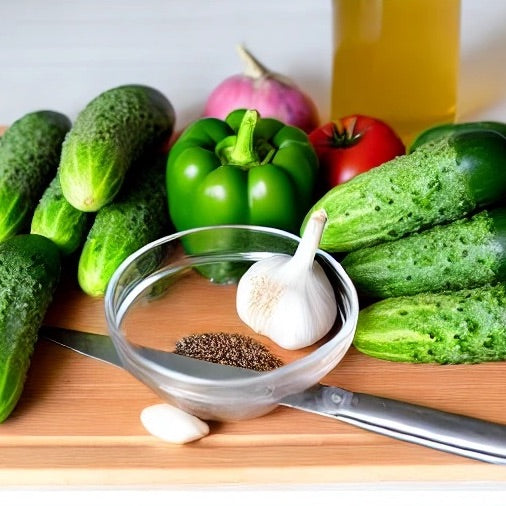
How to Make Homemade Pickles: A Simple Recipe for Gut Health
Share
Fermented foods like pickles have long been celebrated for their health benefits, particularly their positive impact on gut health. The fermentation process involved in making pickles fosters the growth of beneficial bacteria, commonly referred to as probiotics. These probiotics are essential for maintaining a balanced gut microbiome, which plays a crucial role in digestion, nutrient absorption, and immune function. Consuming fermented foods regularly can help replenish and diversify the gut bacteria, which is especially beneficial after a course of antibiotics or an illness that disrupts the gut's natural flora.

While pickles are not considered a high-fiber food, they still contribute to a healthy digestive system in other ways. The fermentation process, rather than the fiber content, is what makes pickles beneficial for gut health. The beneficial bacteria produced during fermentation can help improve digestion and enhance nutrient absorption. For a diet rich in fiber, it is important to include a variety of fruits, vegetables, whole grains, and legumes alongside pickles to ensure sufficient fiber intake.
Pickles are also rich in vitamins and minerals, particularly vitamins K and C, which are vital for overall health. Vitamin K plays a significant role in bone health and blood clotting, while vitamin C is a powerful antioxidant that supports the immune system and aids in the absorption of iron from plant-based foods. The brine used in pickling often contains spices like garlic and dill, which have their own health benefits. Garlic, for instance, has antimicrobial properties that can help fight infections, and dill is known for its antioxidant and anti-inflammatory effects.
Incorporating pickles into your diet can also aid in weight management. Pickles are low in calories yet packed with flavor, making them a satisfying snack option that can help curb hunger and prevent overeating. The vinegar in the brine may also have appetite-suppressing properties and can help stabilize blood sugar levels, reducing the risk of insulin spikes and crashes. By promoting a healthy gut through beneficial bacteria and providing essential nutrients while keeping calorie intake low, pickles and other fermented foods can be a valuable addition to a balanced and health-conscious diet.

Simple Dill Pickles
What you'll need:
- 4 cups water
- 4 cups white vinegar
- 1/2 cup salt (non-iodized)
- 4-6 cloves garlic, peeled
- 4 sprigs fresh dill
- 1 teaspoon black peppercorns
- 1 teaspoon mustard seeds (optional)
- 4-6 small cucumbers (Kirby cucumbers are ideal), sliced or whole
How to make it:
-
Prepare the Brine:
- In a large pot, combine the water, vinegar, and salt. Bring the mixture to a boil, then remove from heat and let it cool to room temperature.
-
Sterilize the Jars:
- While the brine is cooling, sterilize your jars and lids by boiling them in water for 10 minutes. Allow them to dry completely.
-
Pack the Jars:
- Place 1-2 garlic cloves, 1 sprig of dill, a few peppercorns, and mustard seeds (if using) at the bottom of each jar.
- Pack the cucumbers tightly into the jars.
-
Add the Brine:
- Pour the cooled brine over the cucumbers, ensuring they are completely covered. Leave about 1/2 inch of space at the top of each jar.
-
Seal the Jars:
- Screw the lids onto the jars tightly.
-
Refrigerate:
- Store the jars in the refrigerator. Let the pickles sit for at least 24 hours before tasting, but they’ll be best after a week.
Enjoy your homemade pickles!
